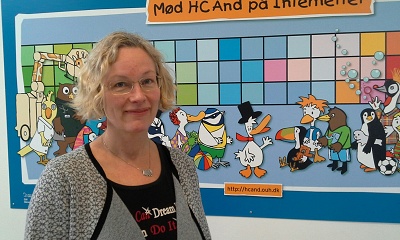No decisions about you without you

Development nurse Mette K. Kaltoft, PhD, believes that we are better able to assess our own health and body functions if we learn about them in childhood. She refers to hcand.dk as a good example – this activity website for children aged 3-7 years uses the idea of opening doors to inform about health and illness.
Should one say yes or no to take medicine, to undergo a treatment or to have surgery? Decisions like these should always take account of the patient’s knowledge and experience with their illness, as well as possible side effects, quality of life and lifestyle, believes Development nurse Mette K. Kaltoft, PhD.
Mette K. Kaltoft seeks clarity and transparency in the health care system, and she believes that patients should be heard to a far greater extent than is the case today. And she would like the current informed consent process to be changed to ‘No decision about you without you.’
- We demand a lot of our patients. They have to decide whether or not to take a certain kind of medicine, they have to give informed consent to various examinations and possibly to surgery. And patients rely on their doctor’s recommendation. I am researching an approach that could be added to the doctor-patient consultation to provide health professionals with knowledge about what is important to the individual patient.
Great responsibility on the patients’ shoulders
Patients are far more than their illness, and they take a great responsibility on their shoulders when they decide whether or not to say yes to a treatment. Is the timing right, do they have the strength to undergo an operation, what does their partner think, how is their psychological and physical health?
- The answers to these questions and many others are relevant to the decision to recommend treatment, says Mette K. Kaltoft.
- I am in no doubt that everyone does their best. We have specialists in all fields with expert knowledge about different illnesses and their treatment. But in my opinion, we lack an analysis of what the quality of the overall treatment is likely to be in the short and long term.
Mette K. Kaltoft believes that this quality depends partly on the health personnel’s knowledge and experience, and partly on their ability to separate the documented and experience-based knowledge from personal values and preferences.
Sundhed.dk could be the platform
A single screen picture could be the way to collect and share experience-based knowledge over time. And Mette K. Kaltoft believes that the basis for this is already well established in Denmark.
- All Danish citizens can see their medical records and read about their stay at the hospital, but they cannot add information themselves. That could be made possible, however, by integrating a ‘decision module’ into sundhed.dk, so that all parties could be heard.
The patients who have participated in Mette K. Kaltoft’s PhD project could log on to a common interactive platform ‘My Decision Package’ as preparation for a consultation with their physician.
- The patients mark their answers to various questions before and after the consultation. They rate the level of disease burden and also assess their lifestyle and quality of life – subjects in which they are experts. The physician also gives an assessment, and the combined results are a good starting point for the next conversation, says Mette K. Kaltoft, who believes that the patient’s own views should always be taken into account in any decisions like a ‘second opinion’ for the doctor.
Would we rather live long or live well?
What are we willing to expose ourselves to, and what is important to us: To live long or to live well, asks Mette K. Kaltoft.
- This question can sometimes become an issue for patients with cancer who have been through pretty tough treatment. Some of them come to a point where they feel that they cannot continue. Maybe this decision could and should have been taken much earlier from both a personal and a health care point of view.
Health costs and funding cutbacks are part of the current political agenda, and Mette K. Kaltoft believes that a ‘decision matrix’ would in itself result in greater awareness about decision-making processes; this knowledge could make it easier to prioritize health funds in the future.
- The data that are collected could be included in an anonymized form in a database that could add valuable information to research projects that traditionally include a small number of patients.
- The health care system would thus have a better basis for assessing which treatments are beneficial and which are not. But the primary basis for my research is that all citizens should have the opportunity to contribute with an assessment of what is good or bad for them – it should not be the system that decides for us.
Facts
“Shared decision support – better decision quality” is the title of Mette K. Kaltoft’s research project. She is Development nurse at the Department of Medicine, OUH Svendborg. She has undertaken the clinical studies in London and Sydney in collaboration with patients with chronic inflammatory bowel disease, and with the Crohn’s Colitis Association in Denmark.
The Australian part of the project has contributed, among other things, to the following websites:
http://www.cafeannalisa.org.uk
http://healthedecisions.org.au
More information?
 |
Ph.d. Mette K. Kaltoft, Development Nurse Medical Department M, OUH Svendborg Mail: mette.kjer.kaltoft@rsyd.dk |

